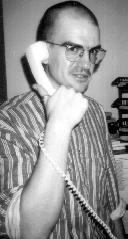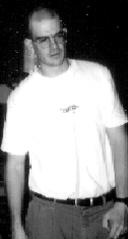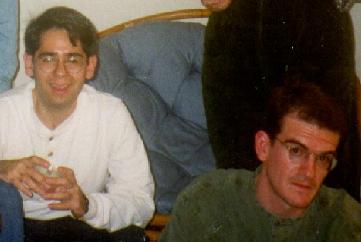Our first year of college, Jos and I were in the same sponsor group -- which at Pomona is a group of about 14 students who all live in the same area and that the college hopes will somehow mesh together well.
In the modern parlance, we were a Real World episode unto ourselves. Our colorful and in many ways stereotypical cast included a Malaysian kung-fu Buddhist, a neo conservative bow-tie wearing Republican, a Bulgarian soldier turned scholar, a New York grunge-loving bohemian, a science-inclined Asian, an impoverished and at times quiet Hispanic and... Jos, someone who defied simple categorization.
I turn your attention now to Adam, the New York grunge-loving bohemian. Adam was anachronism. There was a time when the youth of America turned to music idols and saw in them more than just entertainment. In the 60s (or so I have read) young people called Bob Dylan the voice of their generation, a vox populi poet laureate of sorts. In the 70s, but to a lesser degree, it was Jim Morrison. But by the 80s, there really wasn't anyone. Michael Jackson? Prince? It just wasn't the same.
 And so come the 90s, when the children of the 70s arrived college, the idea of a singer speaking for a generation of American kids was foreign to us.
And so come the 90s, when the children of the 70s arrived college, the idea of a singer speaking for a generation of American kids was foreign to us.
But not so for Adam.
Adam heard something in Kurt Cobain's lyrics that made him speak about Kurt as if he were talking about a spiritual leader. He would talk about the "wisdom" and "insight" of the man, how his lyrics - "here we are now/ entertain us/i feel stupid and contagious" - spoke to a generation of lost children raised in a media saturated age that cared more about the circus than civics.
In retrospect, Adam was probably right to some degree. There was a significant audience for Cobain's music, suburban kids raised less by their affluent parents and more by video games and lithium. Kids who felt they were detached from a broader world of meaning and who found it in someone who sang about just that.
But for me, and apparently for Jos, that didn't apply. As someone who from time to time had to eat cereal with water, the idea of some well-off suburban kids lamenting their lives because they're filled with money, drugs, leisure time and not much else was ludicrous, to put it mildly. But it was also alien. That just wasn't my upbringing and so Kurt's chords didn't speak to me.
Jos, on the other hand, knew these kids. Went to school with them. Was friends with some. But was never a part of 'em. Meandering though he may have been at times, I would never have described Jos as lost.
And so, it is with that context that you must understand that whenever Adam, the New York bohemian, would proselytize about Cobain there were at least two in our group who turned a deaf ear.
And unfortunately, later we would turn tone deaf ears as a result...
The phone rang. It was the week of April 11, 1994, a few days after news broke of Kurt Cobain's death. Jos was on the phone, asking me to come into the KSPC studios.

 KSPC was Pomona College's very own radio station. It broadcast on 88.7 FM and was an honest-to-god alternative music outlet. The Cure, Pearl Jam, Greenday - none were played on KSPC. If you had heard of 'em, they weren't on KSPC. KSPC was about introducing people to niche groups, new sounds.
KSPC was Pomona College's very own radio station. It broadcast on 88.7 FM and was an honest-to-god alternative music outlet. The Cure, Pearl Jam, Greenday - none were played on KSPC. If you had heard of 'em, they weren't on KSPC. KSPC was about introducing people to niche groups, new sounds.
That sort of approach doesn't win many converts, admittedly. KSPC's listening audience was small to say the least. But the station's goal was primarily to expand the horizons of the few who tuned in.
The few. Keep that in mind.
On KSPC, Jos' persona was Manic Stylings, best described as half carnival barker, half audiophile -- all caffeine. The format for his show was basically genres of all kinds melded with a complimentary mish-mash of musings. One second, Jos could be talking about how McDonald's is partially to blame for global warming and the next he would be introducing "Where are we going to work when the trees are gone?" by Jello Biafra and Mojo Nixon.
But it wasn't a talk show. Jos had never had guests on before. But of course, Jos wasn't the kind of guy to shy away from the unprecedented.
And so it was that I was holding a phone to my ear, hearing Jos explain why I should come in and be a guest on his show for the afternoon.
I wish I could say that I tried to protest. I wish I could tell you that I raised objections and pointed out the delicacy of the situation. But in truth, I did neither.
 Instead, I readily went down to KSPC, greeted Jos, did a mike check, adjusted my ear phones and sat opposite my friend as he introduced his guest for the hour.
Instead, I readily went down to KSPC, greeted Jos, did a mike check, adjusted my ear phones and sat opposite my friend as he introduced his guest for the hour.
"Hey there. And welcome back K-S-P-C radio with your host, Manic Stylings. Tragic news this weekend. Grunge star Kurt Cobain apparently committed suicide. Was it the pressures of stardom? drugs? depression? With us in the studio is Dr. Alejandro Cabrera, unofficial biographer of Kurt Cobain to talk through these issues this hour. Dr. Cabrera, thank you for being on the show."
In the best affected sounding voice I could muster, I replied, "Thank you for having me on Manic."
"A terrible tragedy," Manic continued.
"Yes indeed," I replied. "A terrible tragedy. In the end, the pressure was simply too much for Kurt."
"Now when you say pressure, what are you referring to exactly? The bright light of stardom? His up and down relationship? The drugs?"
"Well, all of those things and yet none of them."
"Interesting, Dr. Cabrera, please elaborate."
And against my better judgment, I did. I touched on each of those things, but what I focused on ultimately was that Kurt felt stifled as an artist.
"This may surprise a lot of your listeners, Manic, but Mr. Cobain and his band 'Nirvana' didn't start as a grunge band at all. They had a more classical sound and did fairly well with it, but in smaller niche venues," I said. "Eventually, they caught the eye of a record executive who - sadly - liked their look but not their sound."
"Wait, wait. You're telling me that 'Nivrana,' the band that today and probably for years to come will stand as the epitome of the grunge movement didn't start as a grunge band?"
"That's right Manic. Like I said, their music was much more classical and niche. What they did have, however, was the right look. The flannel shirts, the Seattle unkempt look, the long hair. In fairness, that look didn't exactly mesh well with their self-chosen style of music either. After all .... "
"Dr. Cabrera. You've followed Kurt Cobain's rise to stardom closer than anyone and so you are certainly the authority in these matters, but I'm finding this hard to believe. What proof do you have of this?"
"Well, I have some early recordings, bootlegged from the venues they played at. But the sound, as you can imagine, is pretty poor. But more importantly, I think Kurt himself made clear in 'Smells Like Teen Spirit' where his heart truly was when it came to musical expression. If you play that track backwards, I think you'll understand."
"Well, let's do that now."
And with that, Jos spun up a sound effect, that of a record needle hitting vinyl, the sound of a record being played backwards and then hit the switch for the CD that he had brought into the studio that evening.
The sound of Mariachi music filled the studio.
"That's right Manic, Kurt Cobain was really an aspiring Mariachi musician."
Jos and I muted our mikes and burst out laughing. Looking back, I can't believe we did this. Older now and having experienced the loss of both my father and my best friend in my early 20s, I can't imagine ever making light of anyone's death as I did then. But relatively speaking, we were kids and were behaving like kids.
And like most children who misbehave, eventually there's a price to pay.
Remember how I mentioned that KSPC was a small radio station? That few people listened to the station, let alone ever called it?
While the mariachi tracks played on, and Manic and I talked, the switchboard lights, one by one, started to light up. Manic noticed it first.
"KSPC, 88.7 FM."
Manic nodded with a grin. Listened. Nodded some more. While I couldn't make out the words, it was clear that the caller was upset and was calling to complain.
"I see," said Manic. "Well, Dr. Cabrera is an expert... Well, he said he was the unofficial biographer.... Have you tried playing the track backwards? Hello?"
But as he fielded more calls, Manic slowly became Jos again. And he began checking himself and more importantly sincerely apologizing for offending fans and those who simply found our humor in poor taste.
The transition for Jos was a smooth one. He understood the offense and dealt with the callers deftly. When we came back from the music, we quickly ended the segment and Manic continued on his way as if nothing had ever happened.
I waited in the studio for Jos to finish his show. A few more calls came in, and Jos waved me over to the switchboard, where I handled them as best I could. As I talked to the offended fans, I honestly felt horrible. I got that sinking stomach feeling that comes over us all when we've done something we shouldn't and have been caught doing so.
 When the show ended,
Jos and I walked from the studio back to the dorms.
In typical Jos fashion,
he was already talking about what was next.
The ideas came quickly to him and having finished with one,
he had already started focusing on another.
When the show ended,
Jos and I walked from the studio back to the dorms.
In typical Jos fashion,
he was already talking about what was next.
The ideas came quickly to him and having finished with one,
he had already started focusing on another.
I interrupted and asked if he was worried about the possible ramifications of us having made light of the recently departed.
"Not at all, my friend."
And that was it. With those words, he dismissed the notion.
Life went on.